AI DJ Thy: The Shocking Revelation of Artificial Intelligence in Australian Radio Stations
In the fast-paced world of radio broadcasting, innovation is key to staying ahead of the game. However, the recent revelation that Australian radio station CADA had been using an artificial intelligence (AI) DJ named Thy to host a popular show has shocked listeners and industry professionals alike. The news has sparked a debate about the ethical implications of using AI in place of human talent, raising questions about authenticity and transparency in the media landscape.
For months, DJ Thy had been entertaining listeners with a dynamic mix of music, witty banter, and engaging commentary. His show had quickly gained a loyal following, with many tuning in regularly to hear his latest playlists and opinions on current events. Little did they know that Thy was not a real person but a sophisticated AI program designed to mimic the style and personality of a human DJ.
The use of AI in radio broadcasting is not entirely new, with some stations experimenting with automated playlists and voiceovers. However, the idea of an AI DJ hosting a live show and interacting with listeners in real-time represents a significant leap forward in the integration of artificial intelligence in the industry. While some see this as a bold move towards innovation and efficiency, others view it as a concerning development that blurs the line between human creativity and machine automation.
One of the main criticisms of CADA’s decision to use AI DJ Thy is the lack of transparency surrounding his true identity. Listeners were led to believe that they were engaging with a real person, forming connections and developing preferences based on a false premise. This raises important questions about media authenticity and the responsibility of broadcasters to disclose when AI is being used in place of human talent.
Moreover, the sudden reveal of DJ Thy’s true nature has sparked a debate about the future of radio entertainment and the role of AI in shaping content creation. While AI technology has the potential to streamline processes, generate personalized content, and improve listener experiences, it also raises concerns about job displacement, ethical standards, and the erosion of human creativity in the media industry.
In response to the backlash, CADA has issued a statement acknowledging the use of AI DJ Thy and emphasizing the station’s commitment to exploring new technologies in radio broadcasting. While some listeners have expressed disappointment and even outrage at being deceived, others have praised the station for pushing boundaries and embracing innovation in a competitive market.
As the dust settles on this controversial revelation, one thing is clear: the integration of AI in radio broadcasting is a complex issue that requires careful consideration of the ethical, cultural, and creative implications. While the use of AI technology holds promise for enhancing efficiency and personalization in content delivery, it is essential for broadcasters to be transparent about its implementation and to uphold the integrity of their craft in the face of ever-evolving technological advancements.
In the end, the story of DJ Thy serves as a cautionary tale about the power and pitfalls of artificial intelligence in the media industry. As broadcasters continue to navigate the complex landscape of technological innovation, they must strike a balance between embracing progress and preserving the authenticity and humanity that define the art of radio broadcasting.
AI, Radio Station, Innovation, Ethics, Transparency












